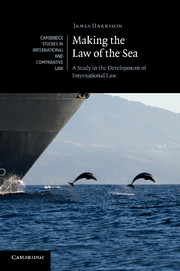Book contents
- Frontmatter
- Contents
- Acknowledgements
- Table of treaties
- Table of cases
- Abbreviations
- 1 Making the modern law of the sea: challenges and opportunities
- 2 The United Nations Convention on the Law of the Sea
- 3 Amendment and modification of the Law of the Sea Convention by the States Parties
- 4 Implementing agreements
- 5 Developments in the deep seabed mining regime
- 6 The International Maritime Organization and the international regulation of shipping
- 7 The contribution of the Food and Agriculture Organization to international fisheries law
- 8 Cooperation, coordination and conflict between international institutions
- 9 Conclusion
- Bibliography
- Index
- CAMBRIDGE STUDIES IN INTERNATIONAL AND COMPARATIVE LAW
1 - Making the modern law of the sea: challenges and opportunities
Published online by Cambridge University Press: 03 May 2011
- Frontmatter
- Contents
- Acknowledgements
- Table of treaties
- Table of cases
- Abbreviations
- 1 Making the modern law of the sea: challenges and opportunities
- 2 The United Nations Convention on the Law of the Sea
- 3 Amendment and modification of the Law of the Sea Convention by the States Parties
- 4 Implementing agreements
- 5 Developments in the deep seabed mining regime
- 6 The International Maritime Organization and the international regulation of shipping
- 7 The contribution of the Food and Agriculture Organization to international fisheries law
- 8 Cooperation, coordination and conflict between international institutions
- 9 Conclusion
- Bibliography
- Index
- CAMBRIDGE STUDIES IN INTERNATIONAL AND COMPARATIVE LAW
Summary
The challenges of international law-making
The law of the sea is an important area of international law that regulates the uses of the world's seas and oceans. The law of the sea defines the jurisdiction of states over all kinds of maritime activities, including navigation, the exploitation of living and nonliving resources, the laying of cables and pipelines, and the conduct of marine scientific research. This book is not intended to explain in detail what substantive rights and obligations arise in this area of international law. Rather, it is concerned with explaining and analyzing the process of how the law of the sea is created and how it can be adapted to meet modern challenges facing the international community.
Since very early in the history of the law of the sea, it has been recognized that no single state has an exclusive claim to the vast expanses of the oceans. Rather all states, whether they are coastal or landlocked, have been seen as having an interest in the sea and its resources. Thus, McDougal and Burke describe how “the historic function of the law of the sea has long been recognized as that of protecting and balancing the common interests, inclusive and exclusive, of all peoples in the use and enjoyment of the oceans, while rejecting all egocentric assertions of special interests in contravention of the general community interest.” This remains true today.
- Type
- Chapter
- Information
- Making the Law of the SeaA Study in the Development of International Law, pp. 1 - 26Publisher: Cambridge University PressPrint publication year: 2011



